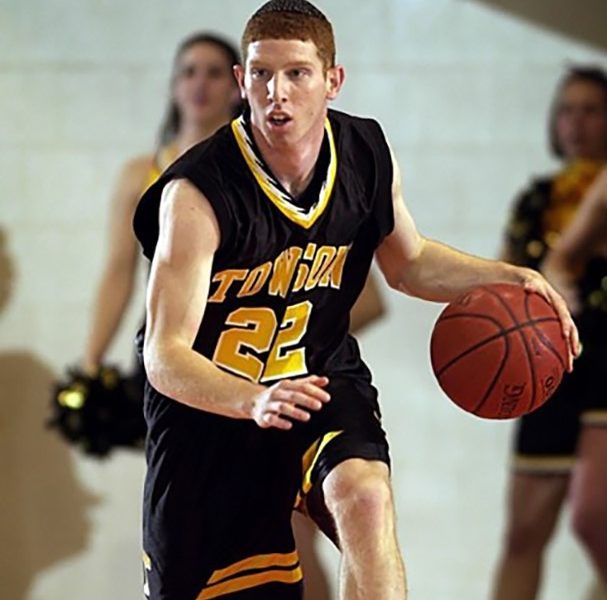Sport
The record-breaking, observant “Jewish Jordan”

Although basketball seldom grabs the headlines in South Africa, SA Jewish Report readers have probably heard of Michael Jordan, Magic Johnson, and Lebron James.
Another basketballer who played in the prestigious Capital Classic All-Star Game, American-Israeli Tamir Goodman, is a religious Jew who, as a 17-year-old high-school junior at the Talmudical Academy of Baltimore in the United States, was dubbed “the Jewish Jordan” by Sports Illustrated magazine.
The 6-foot-3 (1.9m-tall) Goodman went on to become the first Jewish basketball player to play Division-1 college and professional basketball without playing on Shabbat. He also set the record as the first yarmulke-clad player in Division-1 college basketball history.
Excited by the upcoming movie about his life, Goodman believes that “basketball is a universal language”, and he offers physical, mental, and spiritual lessons in his book, Triple Threat. He described some of the qualities that stood him in good stead.
“I would like to share the messages of humility, resilience, strong identity, time management, organisation, dreaming big, listening, paying attention, and trying to learn each day. Do small things well all the time, which will eventually lead to big accomplishments. Don’t stay too down when you’re down, and don’t celebrate too much when you’re on top of your game.”
Growing up as an Orthodox Jew in Baltimore, Maryland, in the 1980s, Goodman had eight siblings, and began playing basketball at the age of five. His father, Karl, was an attorney, and his mother, Chava, threw the javelin and discus.
In spite of his dream of being an elite basketballer seemingly out of reach as most teams played on Shabbat, the sport was Goodman’s passion, and he could practice regularly as his family had a hoop in the backyard.
He gained national attention after averaging more than 35 points per game as a junior at the Talmudical Academy. In Grade 11, he was ranked the 25th best high school player in the country.
Frequently, Goodman’s religious and secular worlds overlapped. After completing a 24-hour religious fast, Goodman placed second in a local slam-dunk contest in 1998.
He didn’t know how he was going to be able to pass his SATs because not only was there high expectation of him as a basketballer, he had also been diagnosed with severe dyslexia.
“What G-d hindered him with, G-d blessed him with something else,” Goodman’s high-school coach, Harold Katz, later said. “His vision was honestly as good as anybody I’ve ever seen play basketball.”
Goodman received a scholarship from the University of Maryland, and his life changed completely. News of his plans to play in one of the top-ranked basketball teams in the country attracted more than 700 media requests that week, he said. “I remember going to services with my father on Friday night. There were reporters inside the temple. It was just completely indescribable.”
He chose to play for Towson University, which better accommodated his religious observance.
“I realise G-d gave me this talent and if I use it the wrong way, he can take it away from me just as fast as he gave it to me,” Goodman said at the time.
The first freshman to start at Towson in more than a decade, Goodman was presented the Coach’s Award for his performance on the court and in the classroom.
Once, when the team was on the road and sundown was approaching, Goodman got out of the van and walked three blocks to a house where he was staying for Shabbat.
“My teammates see me fasting on some days, and they learn about havdalah and kosher food,” Goodman said. “It’s a great opportunity to teach them about Judaism.”
After Goodman and his Towson teammates finished seventh on the 2000/2001 America East Conference standings, the university changed its head coach.
Goodman and the new incumbent didn’t have the best relationship.
“I thought to myself, ‘What clearer message could I have had from G-d telling me it was time to leave Towson?’” said Goodman. “I just picked up and went on to Israel.”
He joined Maccabi Tel Aviv, a powerful force in European basketball.
“It was a pretty easy choice for me. I wrote in my seventh-grade yearbook that I wanted to be a professional basketball player in Israel and serve in the IDF [Israeli Defense Forces].”
In 2004, he took a break from the sport to accomplish the latter. He was named the most outstanding soldier of his platoon in boot camp, and did guard duty right in front of Gaza.
Since retiring from professional basketball in 2009, he has evolved into a successful coach, educator, motivational speaker, and entrepreneur.
Goodman has spoken via Zoom to communities around the world during the COVID-19 pandemic in an attempt to inspire them. “I’ve spoken to different synagogues and community centres across South Africa,” he says. “Hopefully one day I will come on a basketball speaking and clinic tour in the country.”
